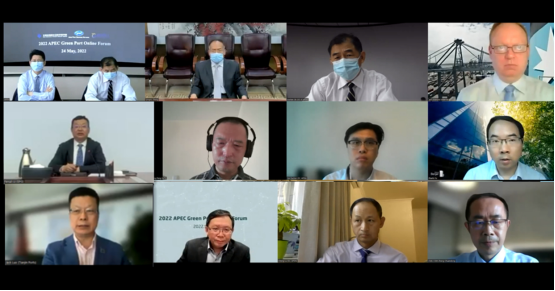
Green Port Development and Carbon Reduction Initiatives in the Asia-Pacific
On May 24, 2022, the 2022 APEC Green Port Online Forum was successfully held virtually. With the theme of “Green Port Development and Carbon Reduction Initiatives in the Asia-Pacific”, the 2022 APEC Green Port Online Forum was hosted by the APEC Port Services Network (APSN) and China Waterborne Transport Research Institute (WTI), co-hosted by Shandong Port Group. About 176 participants from 11 APEC member economies attended the Forum, including Canada; China; Hong Kong, China; Korea; Malaysia; the Philippines; Singapore; Chinese Taipei; Thailand; the United States and Viet Nam. The Forum was also attended by participants from such European economies as UK, Germany, Denmark and the Netherlands.

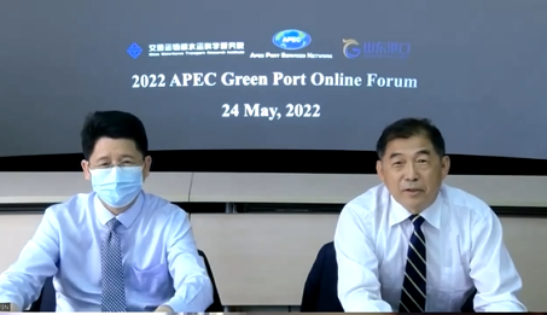
The Forum was moderated by Dr. Jia Dashan, Secretary-General of APSN. Mr. Marc-Yves Bertin, President of the APSN Council, declared the Forum open. Both the President and the Secretary-General of APSN welcomed all speakers and participants to the Forum and thanked all speakers for sharing their knowledge and expertise with all participants. In his opening remarks, Mr. Marc-Yves Bertin, President of the APSN Council, pointed out that the topics to be discussed at the Forum would be critical to the collective prosperity and future of the APEC port and related industries. Mr. President Bertin also highlighted that leaders in the field were invited to share their experiences and creative approaches to managing ports and integrating them into our economies so that participants would learn more about the new developments when it comes to reusing pollutants from ports in ways that reduce their overall consumption and production, and the benefits of these developments extend not only to surrounding communities, but beyond; and this type of creative thinking to find solutions and help us reach economic and environmental security is promising and instills hope. Mr. President Bertin concluded his remarks by stressing: “Economic security and environmental sustainability are inter-dependent. We recognize that in the APSN, which is why the Green Port Award System (GPAS) was created. The Award recognizes ports that demonstrate a commitment towards environmental and social responsibility. These ports know that this is key to long-term growth and ultimately, economic prosperity. What we do now demonstrates our commitment to future generations.”
Speakers and panelists shared their views on the sustainable development issues prioritized by the APEC ports and other emerging issues of keen interest to the port industry and related stakeholders.
China Green Water Transportation Development toward Low Carbon Emission
Mr. Zheng Qingxiu, Deputy Director General, Water Transport Bureau, MOT, China
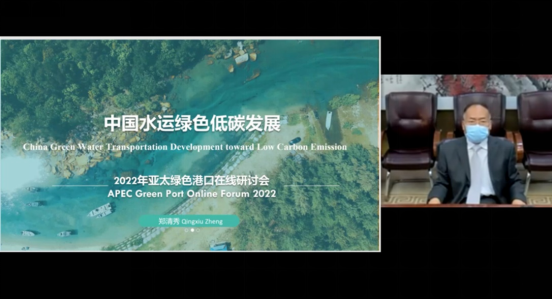
In his presentation, Mr. Zheng Qingxiu firstly thanked the APSN for its continuing efforts to promote the sustainable development of the APEC port industry through the GPAS program – the driving force for all APEC member economies to move forward hand in hand for the past decade and to demonstrate the determination and the strength of the Asia-Pacific community with a shared future to achieve inclusive and sustainable development. Mr. Zheng pointed out that the Chinese government attaches great importance to ecology and environment protection and the MOT of China has actively promoted the green and low-carbon transformation of the water transportation industry. Mr. Zheng mentioned that remarkable progress has been made in terms of: 1) transportation structure adjustment; 2) further advancing the prevention and control of ships and ports’ pollution; 3) the use of onshore power supply; 4) the increasing development of LNG ships; 5) accelerated efforts to develop green waterways and green ports; 6) steady progress in building smart ports and smart waterways; and 7) enhanced international cooperation. Mr. Zheng highlighted that the Chinese government is committed to strive for carbon emission goals – China has made a solemn commitment to the world to achieve carbon emission peak by 2030 and carbon neutral by 2060; and the MOT of China will make continued efforts to promote the high-quality development of transportation. Mr. Zheng emphasized that China will continue to support APEC and APSN’s initiatives to promote green and low-carbon development of water transportation, and China is ready to join hands with other stakeholders to start a new chapter of green port cooperation for the sake of our planet and our future well-being.
MPA's Sustainability Journey
Er. Tham Wai Wha, Chief Sustainability Officer, Maritime and Port Authority of Singapore
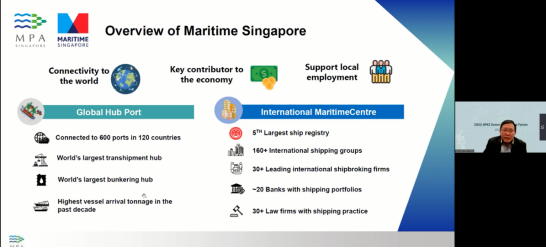 Er. Tham Wai Wha shared MPA’s Sustainability Journey with all speakers and participants in the following aspects:
Er. Tham Wai Wha shared MPA’s Sustainability Journey with all speakers and participants in the following aspects: Maritime Singapore’s Decarbonization Plans, Maritime Singapore Green Initiatives, Sustainable Port Development, Future Marine Fuels Transition, Efforts at IMO and International Platform, Research & Development and Talent, and Carbon Awareness, Carbon Accounting and Green Financing. Er. Tham Wai Wha pointed out that 1) maritime sector contribute 7% of Singapore’s Gross Domestic Product; 2) environmental sustainability is part of a larger national strategy and the initial IMO’s strategy for the shipping industry; 3) Singapore’s Nationally Determined Contribution targets and IMO’s emission reduction targets guide the formulation of MPA’s decarbonization strategy; and 4) Maritime decarbonization will strengthen Singapore's value proposition and enhance the long-term competitiveness of Singapore’s Global Hub Port and vibrant International Maritime Centre. He mentioned that Singapore has pledged with an initial of $100 million to further reduce the environmental impact of the maritime transport sector; and Singapore prepared to support the future of international shipping for a multi-fuel transition; and Singapore actively participated in global discussions on maritime decarbonization efforts. Er. Tham Wai Wha also introduced Maritime Singapore’s R&D Roadmap 2030 and mentioned that MPA has plans to accelerate decarbonization research and development efforts, which include: 1) set aside $9 million under the Maritime GreenFuture Fund to co-fund joint industry projects and trials; 2) Joined with industry partners in Castor Initiative to support the development and trials of vessels utilising ammonia as an alternative marine fuel; and 3) memorandum of cooperation with 6 industry partners, BW Group, Sembcorp Marine, Eastern Pacific Shipping, Ocean Network Express, Foundation Det Norske Veritas and BHP to support lab scale development, land-based trials, and testing of decarbonization technology and alternative energy solutions.
Countermeasures and Suggestions for Low-Carbon Development of Water Transportation in China
Mr. Zhu Jianhua, Vice President of China Waterborne Transport Research Institute
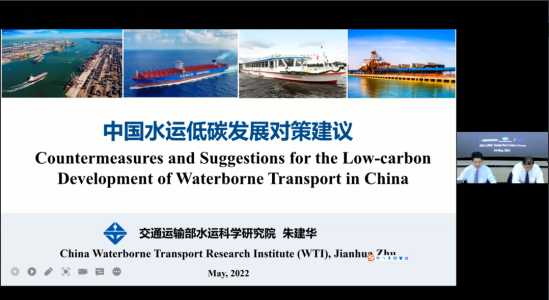
Mr. Zhu Jianhua made a presentation on Countermeasures and Suggestions for Low-Carbon Development of Water Transportation in China. Mr. Zhu pointed out that regarding the development status of waterborne transportation in China, the carbon emissions from waterborne transport in China was around 63 million tons in 2020, and the percentage was about 6.5%; the emissions from domestic shipping was around 51 million tons, and the percentage was about 81%, which plays a decisive role in carbon reduction of waterborne transport; and the emissions from international shipping which arrives and departs from domestic ports was about 12%. At present, there are four major issues in the development of China's waterborne transport, including: 1) Seagoing Vessels: relatively low energy efficiency; 2) Inland Vessels: such as old, small, dispersed and miscellaneous vessels are still prominent; 3) Ship Energy: small proportion of electric ships, and limited applications of low or zero carbon fuels; 4) Ports: relatively low electrification rate of mobile equipment and low degree of specialization and automation. Mr. Zhu then pointed out according to the requirements of the domestic and international situation, in order to improve the low-carbon development of domestic shipping, Mr. Zhu proposed seven countermeasures and suggestions, including: 1) to improve energy efficiency; 2) to enhance R&D and application of low-carbon and zero-carbon fuels for ships; 3) to promote the transformation of power receiving facilities for seagoing vessels; 4) to encourage new passenger vessels to use lithium battery power and to formulate standards of charging facilities and related operational work for electric inland vessels; 5) to improve technical standards and policy system related to the standardization of inland vessels; 6) to accelerate the development of smart waterways and intelligent vessels; and 7) to promote the application of LNG-powered ships and the construction of LNG refilling stations. In order to improve the low-carbon development of ports, Mr. Zhu proposed the following policy recommendations: the electrification of equipment; process specialization; cleaner power; and meticulous management.
Green Port Award System (GPAS)
Mr. Cai Ouchen, Deputy Director, APEC Port Study Center, APSN
Mr. Cai Ouchen, Deputy Director, APEC Port Study Center of APSN, briefly introduced the updates on the GPAS program in the following 4 aspects: (a) the aims, distinguished characteristics, development and implementation process, and the Implementation Plan of the GPAS program, and the endorsement and appreciations from the APEC Transportation Ministers on the program; (b) the updated application rules and procedures of the GPAS; (c) the summarization of the best practices by the GPAS award recipients in efficiency improvement, clean energy, pollution control and ecosystem protection; and (d) the upgrading plan for the GPAS evaluation system: incorporation of climate elements or the development of a new port certification program on carbon emissions.
Decarbonizing of Maersk
Mr. Jens Eskelund, Chief Representative of China, A.P. Moller - Maersk
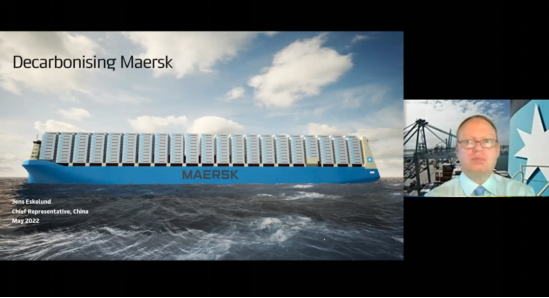 Mr. Jens Eskelund shared Maersk’s efforts in decarbonization with all speakers and participants.
Mr. Jens Eskelund shared Maersk’s efforts in decarbonization with all speakers and participants. Mr. Jens Eskelund pointed out that decarbonization is particularly important in the shipping industry, for 3.5 bn tons of CO2 emissions emitted from global logistics every year and 3% of global CO2 emissions emitted from international shipping. Mr. Eskelund highlighted that A. P. Moller-Maersk has decided to accelerate its decarbonization plans with the vision to achieve net-zero in operation by 2050. Mr. Eskelund mentioned that Maersk raised the key question of what new fuels could be used to decarbonize instead of conventional fuels, and future markets include bio-fuels, green methanol and ammonia. According to Mr. Eskelund, to address the climate crisis, Maersk’s fleet must leap-frog directly to green fuels – no time for transition fuels, and green methanol in combination with biodiesel was seen as the only certain and scalable pathway towards significant impact this decade, and Maersk accelerates fleet decarbonization starting in 2023. The new large container vessels represent a completely new vessel design, which will be 20% more efficient than industry standard, Maersk has made partnerships with six green fuel pioneers that will accelerate the green fuel transition. Maersk believes that China is the ideal economy for methanol production, and that China has the conditions and capabilities to be the world's third largest producer of methanol, while reducing its dependence on imported fuel. Maersk believes that decarbonization requires cooperation not just in production but across the value chain. Maersk's next plan is to have 12 large carbon-neutral container ships running on methanol fuel and Maersk also hopes to establish partnerships with more Chinese partners to further its goal of decarbonizing the shipping industry by 2040.
Upholding Ecological Principles and Promoting Green Development
Mr. Li Fengli, Advisory Board Member, APSN/General Manager, Shandong Port Group
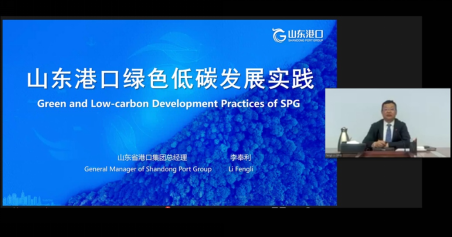 Mr. Li Fengli made a presentation on Upholding Ecological Principles and Promoting Green Development.
Mr. Li Fengli made a presentation on Upholding Ecological Principles and Promoting Green Development. Mr. Li introduced the development of Shandong Port Group (SPG), which was established on August 16, 2019 and in 2021 handled 1.5 billion metric tons of cargo, up 6.1% year on year, and its container throughput grew 8.3% year-on-year to 34 million TEUs. Mr. Li shared SPG’s achievements in developing into green and low-carbon port:1) SPG has been the first to issue Green and Low carbon Development Plan of SPG in the 14th Five Year Plan in China; 2) SPG is making great efforts to prevent and control pollution, to promote the use of clean energy, and to innovate and upgrade the process flow. Mr. Li highlighted that according the Green and Low carbon Development Plan of SPG in the 14th Five Year Plan, SPG is devoted to formulating top-level design of green ports to lead a new ecosystem of green development; applying world’s leading concepts and technologies to create a new model of environmental protection and low carbon; and pursuing persistent innovation and rich connotation to promote a new pattern of carbon-sink balance. Mr. Li pointed out that facing the future SPG will work towards achieving the overall and green transformation of SPG, building an international advanced smart and green port, making steady progress towards becoming a world-class sea port, and contributing more to the development of green and low-carbon ports by sharing SPG’s experience widely.
Best practices of Tianjin Port: The First Zero-Carbon Container Terminal in the World
Dr. Luo Xunjie, Advisory Board Member, APSN/Vice President, Tianjin Port Group
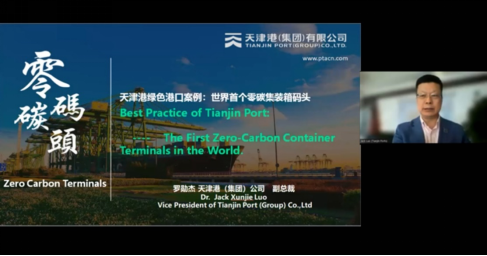
Dr. Luo Xunjie, made a presentation entitled “Best practices of Tianjin Port: The First Zero-Carbon Container Terminal in the World”. Dr. Luo shared Tianjin Port’s practice in developing the first zero-carbon container terminal in the world with all speakers and participants. Dr. Luo highlighted three key technical points of building the Zero-Carbon Container Terminal, which are: 1) Build an "integrated wind, solar, and storage" system, comprehensive utilization of various types of green energy, and fully realize self-supply; 2) Fully apply clean energy, equipment is driven by electricity, fossil fuels are eliminated, and energy consumption and zero carbon emissions of terminal production operations are eliminated; and 3) The world's first "yard horizontal layout side loading and unloading + single trolley ground centralized unlocking" process. Dr. Luo said, facing the future, Tianjin Port will highlight the use of clean energy and reduce pollutant and carbon emission levels in the port area; highlight green and low-carbon transportation and launch the double demonstration brand of "public to rail + scattered reform collection"; and highlight green energy security and build a multi-source integrated green energy system. Dr. Luo pointed out Tianjin Port Group aims to accelerate the development of a people-oriented, safe and healthy and environmentally friendly world-class green port.
Decarbonizing Shipping with CMA CGM
Mr. Zhang Chuandong, General Manager of Public Affairs, CMA CGM (China) Shipping Co., Ltd
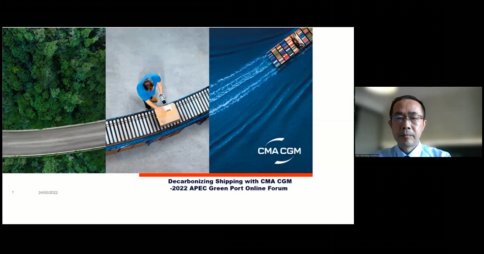
Mr. Zhang Chuandong made a presentation entitled Decarbonizing Shipping with CMA CGM. Mr. Zhang shared with all speakers and participants CMA CGM’s practice in decarbonizing shipping. Mr. Zhang pointed out that CMA CGM Group heads towards Net Zero Carbon by 2050, and he mentioned that: 1) CMA CGM becomes the first shipping company in the world to equip giant containerships with this type of engine. Today, LNG is the most advanced solution when it comes to preserving air quality; 2) CMA CGM accelerates the deployment of marine biofuels; 3) CMA CGM launches the first low-carbon shipping offer by choosing biomethane; 4) CMA CGM participates in the first French port project for BioLNG production; 5) Coalition for Tomorrow's Energy: CMA CGM and 16 Leading International Companies Join Forces. Mr. Zhang highlighted that the Coalition for Tomorrow's Energy aims to accelerate the development of energy solutions that meet the challenges of sustainable mobility for the transport and logistics industry.
Panel Session: Decarbonization of the Port Sector
Facilitator: Mr. Lu Cheng, Director, APEC Port Study Center, APSN
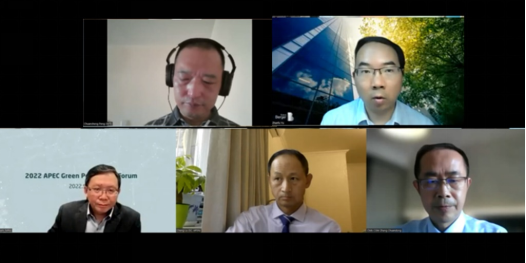
(From left to right:
Mr. Peng Chuansheng, Chief Professor of China Transport Research Institute;
Mr. Yu Zhanfu, Global Partner of Roland Berger and VP of Roland Berger China, Head of Roland Berger Transportation Tourism & Logistics Practice in Asia
Er. Tham Wai Wha, Chief Sustainability Officer, Maritime and Port Authority of Singapore
Mr. Lu Cheng, Director, APEC Port Study Center, APSN
Mr. Zhang Chuandong, General Manager of Public Affairs, CMA CGM (China) Shipping Co., Ltd)
The Panel Session was facilitated by
Mr. Lu Cheng, Director of the APEC Port Study Center of the APSN. Panelists had in-depth exchanges and discussions on the main reasons for ports to take the low-carbon path; the key factors for ports to consider in term of decarbonization; and the major challenges faced by the ports and related stakeholders in the port decarbonization and how to deal with them. As for why the port industry should take a low-carbon path, all panelists agreed that low-carbon development is the general development trend that all industries in the world must follow and the port industry is no exception; and the port industry is a major carbon emitter and thus the port industry is required to make contribution to the low-carbon development of the transport sector as a whole. As for the factors to be considered for low-carbon development, all panelists agreed that appropriate industrial policies are needed first, which are important prerequisites for the port industry to decarbonize; and the maturity of low-carbon technologies and the applicability of relevant technologies are also important basic elements that the port industry must consider in its low-carbon development. Regarding the challenges of low-carbon development, panelists generally agreed that technological maturity and economic maturity are the two most important challenges facing the port industry in its low-carbon development, and therefore governments need to consider providing supportive policy systems and financial subsidies to support the decarbonization of ports.
By engaging policy-makers, academic experts and port leaders to shape the green port agenda in the Asia-Pacific region, the Forum provided a platform to share valuable knowledge and best practices on green port development trends, strategies and policies, technological innovation, and the decarbonization of the port sector so as to promote the sustainable development of green ports in the Asia-Pacific region.
At the closing session, both the President and the Secretary-General of the APSN thanked WTI and Shandong Port for hosting and co-hosting the Forum, and thanked all speakers for their great contributions to the Forum and for all attendees for their active participation in the Forum. The APSN welcomes more ports and port authorities to join the GPAS program and other upcoming APSN events and activities in 2022.
The opinions expressed herein are the author's and not necessarily those of The Xinde Marine News.
Please Contact Us at:
media@xindemarine.com







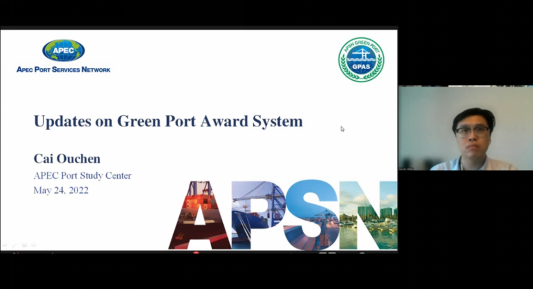





 China’s First Bulk Bunkering of Domestic Green Me
China’s First Bulk Bunkering of Domestic Green Me 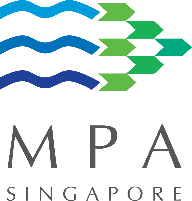 Rotterdam and Singapore Strengthen Collaboration on
Rotterdam and Singapore Strengthen Collaboration on 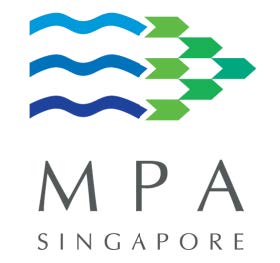 MPA and CMA CGM Sign MoU to Enhance Sustainable Shi
MPA and CMA CGM Sign MoU to Enhance Sustainable Shi 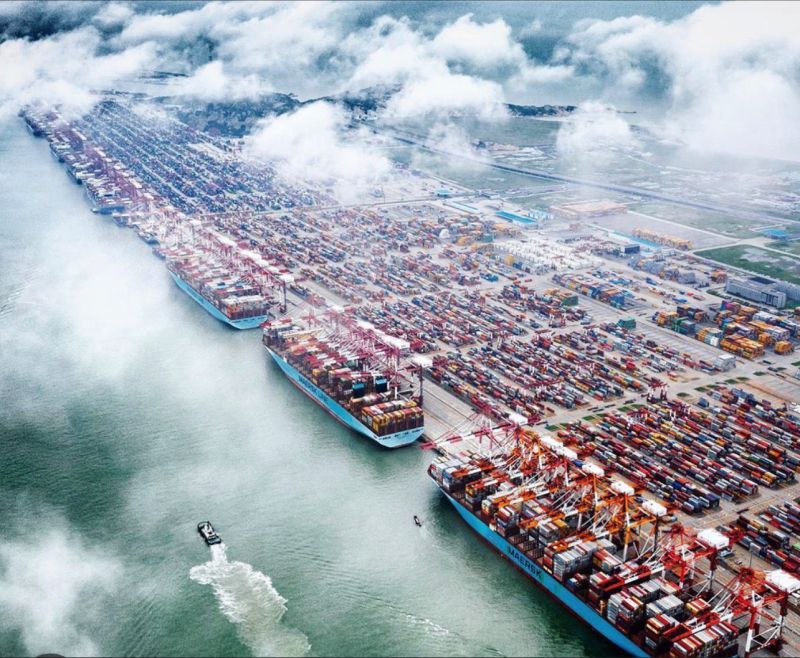 China's Ports Surge Ahead: Major Container Terminal
China's Ports Surge Ahead: Major Container Terminal 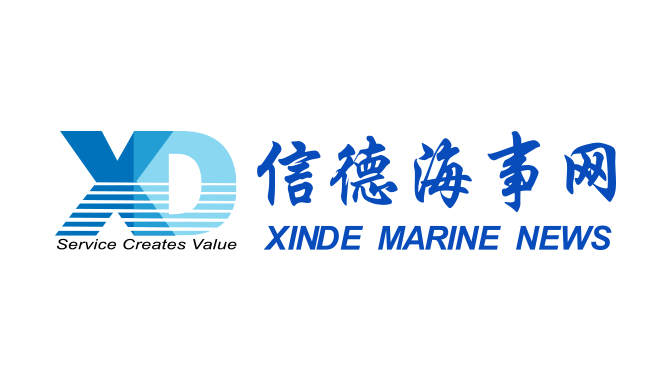 Port of Hamburg: Growth in container throughput and
Port of Hamburg: Growth in container throughput and 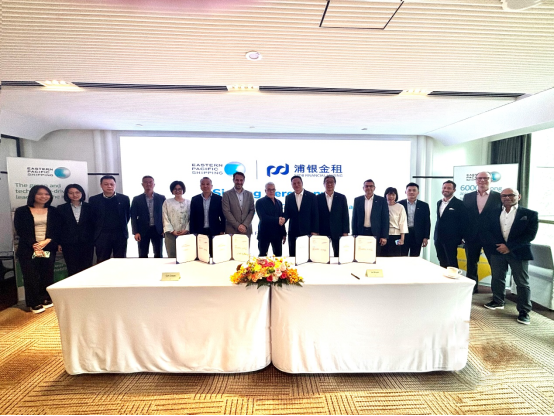 EPS and SPDB Financial Leasing sign financing agree
EPS and SPDB Financial Leasing sign financing agree